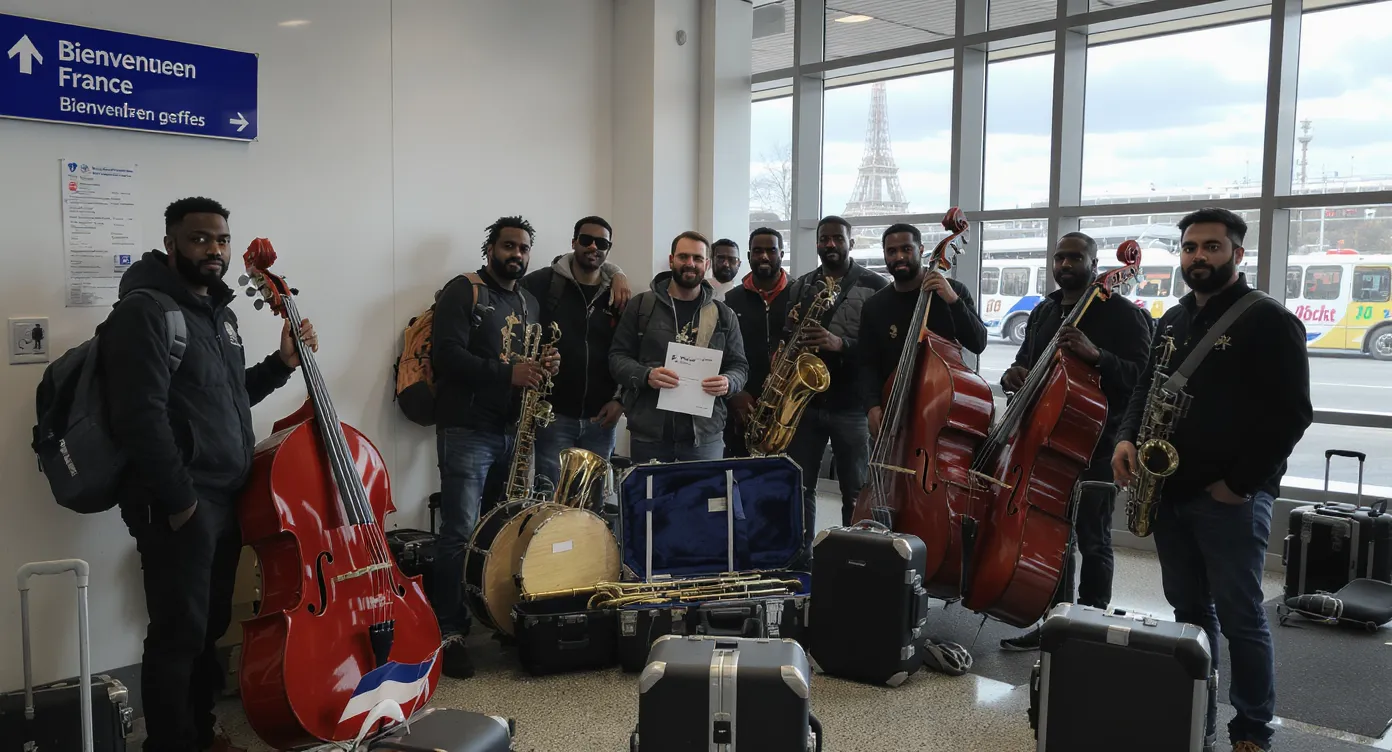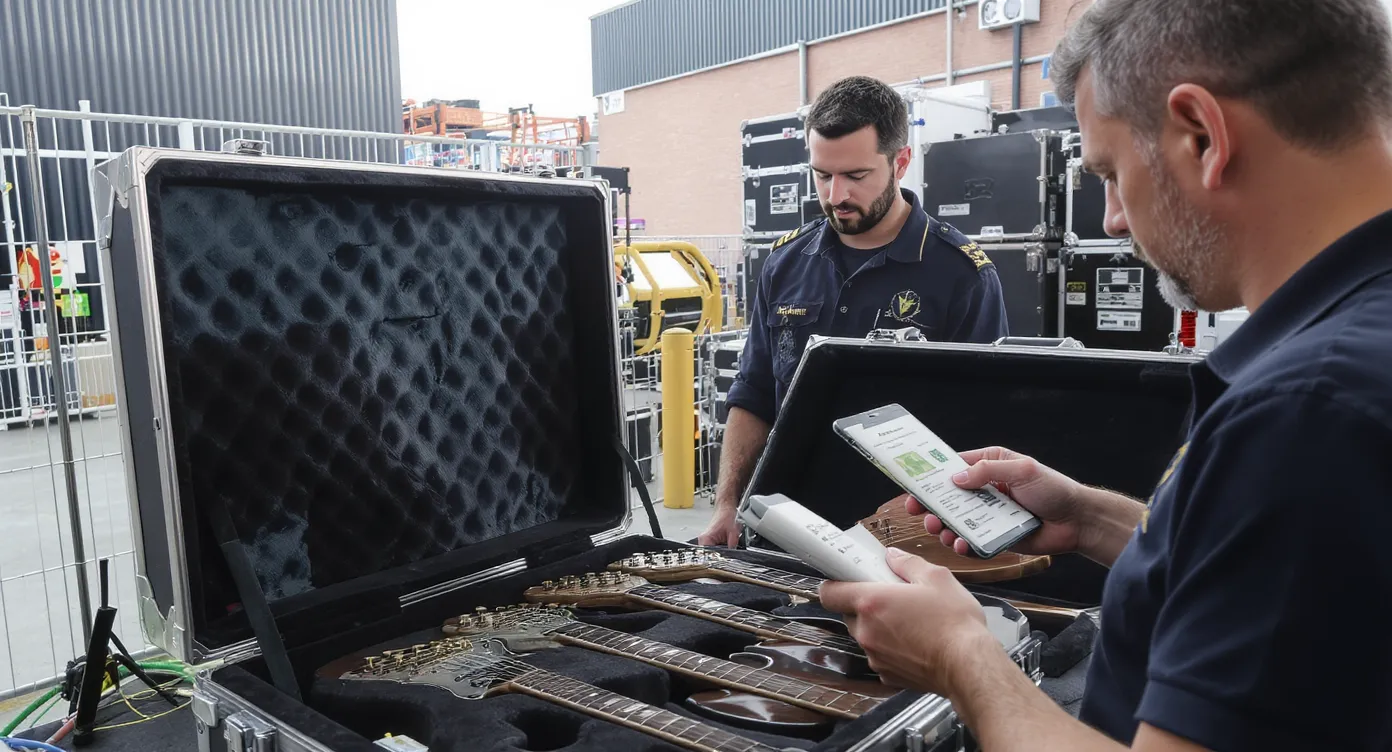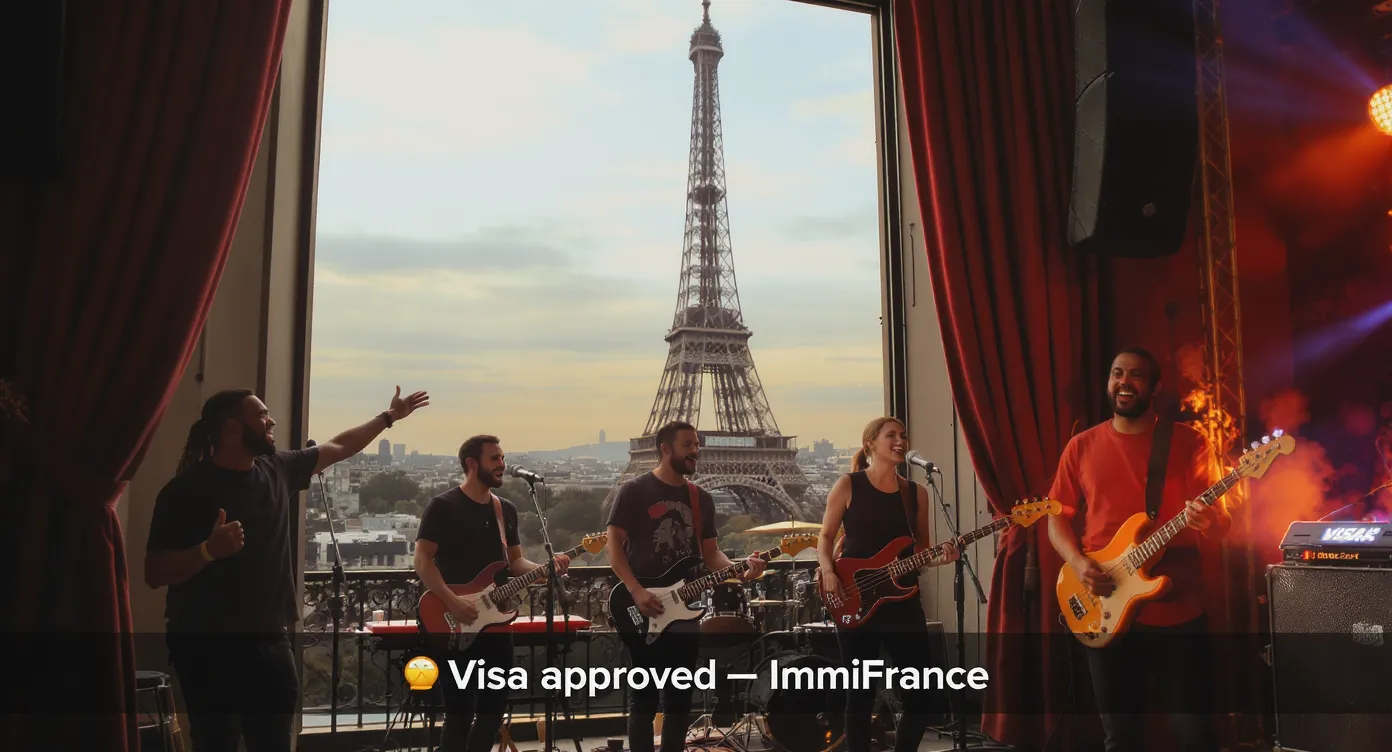Visa Options for Performing Artists and Musicians Touring France

In the post-pandemic boom, France has re-established itself as Europe’s busiest live-music market, with over 6 500 licensed concerts and festivals scheduled for 2026 (CNM data, July 2025). Whether you are a DJ flying in for a single club night, a 40-piece orchestra on a three-month tour, or a self-producing singer-songwriter planning a summer residency, choosing the right immigration route is now critical. Since the 2025 Immigration & Integration Act tightened document checks, border agents increasingly ask performers to prove that both their visa and work authorisation match the engagement. This guide breaks down every visa option available to performing artists and musicians, explains recent legal changes, and shows how ImmiFrance can streamline the process.
1. How French law classifies artistic work
French immigration rules draw a sharp line between paid artistic activity and other cultural visits. If any of the following applies, you are deemed to be “artiste-interprète” under Article L.7123-2 of the Labour Code and need authorisation to work:
- You appear on stage or in studio before an audience or recording device.
- You receive direct or indirect compensation (cachet, per-diem, royalties, even travel-covered gigs).
- The engagement involves rehearsals on French soil.
Voluntary charity performances, promo interviews, and scouting trips normally fall outside this definition, but border police can requalify the trip if they find hidden remuneration or a last-minute paid appearance.
2. Start with two key questions
- Will you stay more than 90 days in any 180-day period?
– If no, a short-stay solution (Schengen type C) is possible.
– If yes, you need a long-stay D visa that doubles as a residence permit. - Who pays you?
– French engager → French labour law applies, often triggering a work permit (Autorisation provisoire de travail, or APT).
– Foreign employer sending you temporarily → Possible posted-worker routes or an exemption.
– Self-employed performer → Entrepreneurial paths such as Passeport Talent – Artiste or Profession libérale.
Answering these questions early avoids last-minute refusals at the consulate window.
3. Short-stay options for tours under 90 days
3.1 Visa-free nationals still need to check work rules
Citizens of 64 countries, including the US, UK, Canada and Australia, may enter France visa-free for up to 90 days. This waiver covers entry only; paid performances still require an APT unless a legal exemption applies.
3.2 The 90-day artist permit exemption (Article R5221-4 CESEDA)
France lets organisers skip the APT for very short artistic events, provided three criteria are met:
- The engagement lasts no more than 90 days in total.
- The artist holds a valid Schengen right of entry (visa-free or already issued visa).
- The employer files an online declaration (dispense d’autorisation de travail) via the “SIPSI” portal at least two working days before the first show.
This exemption now covers festivals, live TV shows, fashion-week gigs and trade-fair showcases. It does not cover nightclub residencies, recurring cruise-ship sets, or studio album projects.
3.3 Standard Schengen Visa “Profession Artistique et Culturelle”
If the exemption does not fit, the engager must request an APT from the Ministry of Labour before you apply for a type C visa marked “artiste”. Processing averages 10-15 calendar days. Attach the PDF approval when booking your France-Visas appointment. Once issued, the visa allows multiple entries during its validity, letting you hop between Schengen shows without new paperwork.
4. Long-stay solutions for residencies and multi-season tours
| Visa / Permit | Typical Duration | Who It Suits | Key Paperwork |
|---|---|---|---|
| Passeport Talent – Artiste/Interprète | 1–4 years | Headline acts, self-producing musicians, choreographers with multiple French contracts | Proof of earnings ≥ SMIC, OR SACEM membership + contracts; no separate work permit needed |
| Travailleur Temporaire (TT) – Spectacle | 3–12 months | Foreign employees hired by a French production company for a tour or musical theatre season | Signed CDD contract + APT (DREETS) |
| Salarié Détaché (Posted Worker) | Up to 3 years | Performers on foreign payroll sent to France (e.g., US orchestra on European leg) | Detaché notification on SIPSI, A1 certificate, long-stay D visa |
| Entrepreneur / Profession Libérale | 1 year (renewable) | Freelance DJs, session musicians billing multiple French clients | Business plan, contracts, URSSAF registration |
4.1 Passeport Talent – the most versatile route
Under Article L313-20 9° CESEDA, the Passeport Talent – Artiste card covers both employees and self-employed performers earning at least the French minimum wage (≈ €1 766 gross/month in 2025). Unlike other permits, it eliminates the APT step and automatically grants free movement within Schengen for 90/180 days. Family members can apply simultaneously for a “Famille Passeport Talent” visa.
4.2 Temporary Worker (TT) visa for anchor contracts
If a French theatre or festival hires you on a fixed-term contract (CDD) longer than three months—common for musical theatre runs—the employer must first secure an APT from the regional DREETS office. After approval, you apply for a long-stay TT visa. Renewals are possible if the engagement is extended.
4.3 Posted-worker pathway removes French payroll hurdles
Large orchestras and touring pop productions often keep artists on home payroll for insurance and tax continuity. Under EU Directive 2014/67/EU, they can use the posted-worker detachment route. The producer files a SIPSI posting declaration and appoints a French representative. You then request a long-stay D visa “travailleur détaché”. Note that French labour inspectors increasingly audit wage slips to ensure equal pay with local musicians.
4.4 Self-employed artists: Profession Libérale visa
For DJs or solo performers invoicing French venues directly, the Profession Libérale permit pairs with France’s micro-entrepreneur tax regime. You must show credible turnover forecasts (around €20 000 for first-year approvals) and a portfolio. If you later sign salaried contracts, switching to a Passeport Talent is straightforward.
5. Step-by-step timeline (example: autumn 2026 theatre tour)
- D-7 months – Block tour dates and identify who pays whom.
- D-6 months – French producer requests APT or gathers Passeport Talent evidence.
- D-4 months – Open your France-Visas file, pay the fee, book consulate biometrics.
- D-3 months – Ship instruments under ATA Carnet if needed; arrange travel insurance.
- D-2 months – Attend consulate appointment with originals + translations.
- D-6 weeks – Receive visa; verify entries against contract dates.
- Arrival + 3 months – Validate D visa online (ANEF) and book OFII medical if staying ≥ 12 months.
- T-120 days before expiry – Begin renewal on ANEF; collect new contracts and tax proofs.
6. Common pitfalls and how to avoid them
- Misunderstanding the 90/180 rule: Remember days spent touring Germany, Spain or any Schengen state also count toward your French short-stay allowance. Our earlier guide on Traveling Inside Schengen with a French Residence Permit explains the maths.
- Last-minute line-up changes: Substitute guitarists still need matching visas; photocopying the singer’s papers won’t work at border checks.
- Back-to-back tours: Two consecutive 60-day stints separated by a short UK leg may exceed 90/180; consider a long-stay visa if in doubt.
- Using the wrong employer name: The entity on your visa sticker must match the one that filed the APT or posting declaration. Mismatches trigger refusals.
- Ignoring French tax registration: Even short-stay artists earning French-sourced income must file an annual tax return. Our guide on Tax Filing for First-Year Residents shows why it also helps future residence applications.
7. Instruments, merch and crew: the immigration extras

- Customs (Douanes): Use an ATA Carnet for temporary import of instruments and stage props. Declare high-value laptops and in-ears on exit to avoid paying 20 % VAT.
- Merchandise sales: Selling T-shirts or vinyl in France counts as a commercial activity; check if you need a bureau de douane declaration and register for VAT if gross sales exceed €10 000.
- Technical crew visas: Lighting designers and sound engineers are usually classed as technicians, not artists. They follow separate “travailleur temporaire” rules—plan parallel filings.
- Social security: EU residents should carry an A1 form; non-EU artists may be enrolled in France’s social-security system (GUSO) for gigs under 100 days.
8. What changed in 2025—and what’s ahead
- Digital APTs: All short-stay work permits are now issued in QR-coded PDF format, replacing the old prefecture stamp. Keep a print-out in each tour bus.
- EES border exit stamps: From October 2025, the EU Entry/Exit System records each day you spend in Schengen electronically. Overstays will auto-trigger Schengen-wide alerts.
- Higher wage thresholds: The 2025 law aligned Passeport Talent criteria with 1× SMIC (up from 0.8). Budget tours should recalculate payroll.
- Upcoming ETIAS: From mid-2026, visa-free artists must obtain an ETIAS travel authorisation (€7) before boarding any carrier to France.
9. How ImmiFrance can help
Navigating visas, work permits and ever-moving French deadlines can derail even the best-planned tour. ImmiFrance offers a turnkey artist-mobility package that includes:
- Eligibility audit and route selection (short-stay vs Passeport Talent vs detachment).
- APT or SIPSI filing within 72 hours—our success rate for 2025 stands at 97 %.
- Consulate-grade document bundles with certified translations.
- Real-time case tracking so managers can see visa progress alongside routing and ticket sales.
- Access to a network of labour and entertainment lawyers for complex co-production deals.

Whether you are planning a single showcase during Paris Fashion Week or a year-long residency at the Philharmonie, the right paperwork keeps the focus on the music—not the queue at passport control. Book a free 15-minute strategy call to secure the ideal visa route for your next French tour and hit the stage with confidence.
